Austrian Authorities Uncover Bulgarian Link in Russian Disinformation Campaign

Austrian authorities have uncovered a large-scale Russian disinformation campaign in the country, linked to espionage allegations against a Bulgarian citizen. The investigation, conducted by the Austrian State Security and Intelligence Directorate, revealed that the woman played a significant role in spreading Russian-controlled propaganda aimed at shaping public opinion against Ukraine.
According to the Austrian news agency APA, citing information from the Directorate, the campaign sought to influence both public and political sentiment in favor of Russia. Investigators found that, just weeks after Russia’s full-scale invasion of Ukraine in February 2022, a Russian intelligence-linked cell became active, launching a coordinated disinformation effort across German-speaking countries, with a particular focus on Austria.
The cell used both online and offline methods to distribute misleading narratives. In addition to spreading manipulated content on the internet, it also engaged in activities such as distributing stickers and graffiti featuring right-wing extremist symbols and nationalist slogans. The goal was to create the illusion that pro-Ukrainian activists were behind the campaign, further destabilizing the perception of Ukraine.
The Bulgarian suspect, whose home was searched in December, was identified as a key contact for Russian intelligence services. Analysis of seized data carriers, including chat messages, indicated that she was tasked with distributing disinformation materials not only in Austria but also in Germany. Furthermore, she meticulously documented her activities, passing this information on to accomplices in Russia and the UK.
State Secretary Jörg Leichtfried warned of the dangers posed by such disinformation efforts, stating that the spread of false narratives and manipulative content undermines trust in institutions and threatens social cohesion. He further emphasized that disinformation can influence elections, contribute to political instability, and pose a broader threat to democratic society.
The woman admitted to working on behalf of the cell, particularly in 2022. Authorities suspect that Russian intelligence directly assigned her tasks related to disinformation distribution. The Austrian Interior Ministry noted that the campaign was structured to ensure that pro-Russian sentiments would gain traction at higher levels within the target countries.
